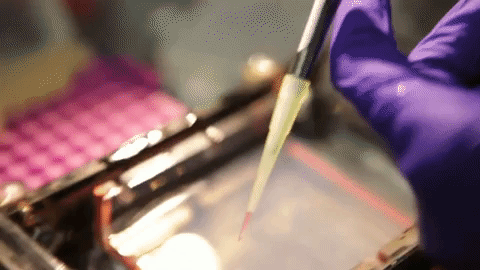In dystopian visions of the future, genetic engineering often plays a part in our demise. Think Gattaca. Or the novel A Brave New World. Or Bladerunner.
But if what it’s not all so bad? What if genetic engineering could eliminate Malaria? Or allow farmers to grow healthy crops without chemicals. Thanks a new advancement in gene editing technology, CRISPR, this future may be within reach soon.
Last Friday night at Genspace’s new industrial-looking lab, I went to a talk about CRISPR. It was led by the director of a new documentary on the topic, Adam Bolt, who’s been researching the technology for the last year. Bolt praised the science and the all the scientists working on it as pioneers of a biological revolution. CRISPR allows scientists to ask new questions: which genes matter, and why?
Bolt used the analogy of a switchboard. Each gene isolated by CRISPR becomes a switch that scientists can flick to test its effects. With enough flicks, they hope to isolate the genes that control genetic disease, tomato tastiness, and maybe even eye color.
Dylan Williams, 26, was impressed. He works in pharmaceuticals and came to the event out of interest in the topic. It’s “an amazing step forward,” he said, there’s “so many terrible inherited diseases that CRISPR could solve.”
But what about those dystopias?
“There’s good reason it should be approached with caution, but I hate the slippery slope argument,” said Jeff Aalberg, 25, who made the trek to Sunset Park all the way from Manhattan. As it is now, there’s “a lottery system for quality of life” he noted. “Any opportunity should be taken to solve it.”
Alex Pound, a 54-year-old software engineer living in Brooklyn, wasn’t as optimistic. “One thing not covered [in the talk] was the negative side. What if you mutate the flu? Certainly there are people out there who want to do that and could turn it loose.”
As we chatted, I couldn’t help but peek over into the gleaming lab. Genspace describes itself on its website as “a place where anyone can learn and work on biotechnology.” They offer four-day “Biohacker Bootcamps,” in which students can “learn all the standard techniques” of gene editing.
While conceptually appealing, the democratization of genetic engineering has consequences that, on reflection, become viscerally terrifying.
As Bolt noted, wistfully, it’s easy to liken CRISPR to Pandora’s box. But, he points out, what technology doesn’t have the possibility for unforeseen consequences? And, unlike nuclear weapons, eugenics and other morally repugnant technologies, CRISPR wasn’t born in a government lab or corporate headquarters. It’s the result of the work of hundreds of scientists, romanticized by Bolt as “just trying to understand how life works.”
It’s easy, however, to overstate CRISPR’s power. Elliot Kirschner, Bolt’s fellow producer, offers a note of caution.
“There’s [a significant] distance between what is written in DNA and your traits. It’s not clear when and how we figure that out,” he said.
Although it wasn’t emphasized in Bolt’s talk, nearly everyone I talked to afterword mentioned the importance of government regulation. Obtaining the chemicals required to perform gene editing is a highly regulated process, and the National Academy of Sciences only recently approved limited government funding of CRISPR research.
“Why,” Bolt asked, “can we not, as a society, figure out how to have the good and not the bad? Where do we set the line?”
I asked Dan Grushkin, cofounder and executive director of Genspace, about the lab’s role in the conversation. “I see us at the forefront,” he said. “[We’re] reaching out to the public. We will inform the debate. This is what you can do with [CRISPR] and here are the social implications.” He gestured at the room around us and added. “We’re very much a community lab. Conversations happen one on one.”
Personally, apprehensions about CRISPR aside, I’m heartened by the notion of innovation happening here in the open rather than behind locked doors at Monsanto’s labs. Thanks to Genspace, you can get hands-on experience with CRISPR and see it for yourself. The next bootcamp starts Oct. 23.
Join the conversation!
Find news, events, jobs and people who share your interests on Technical.ly's open community Slack

